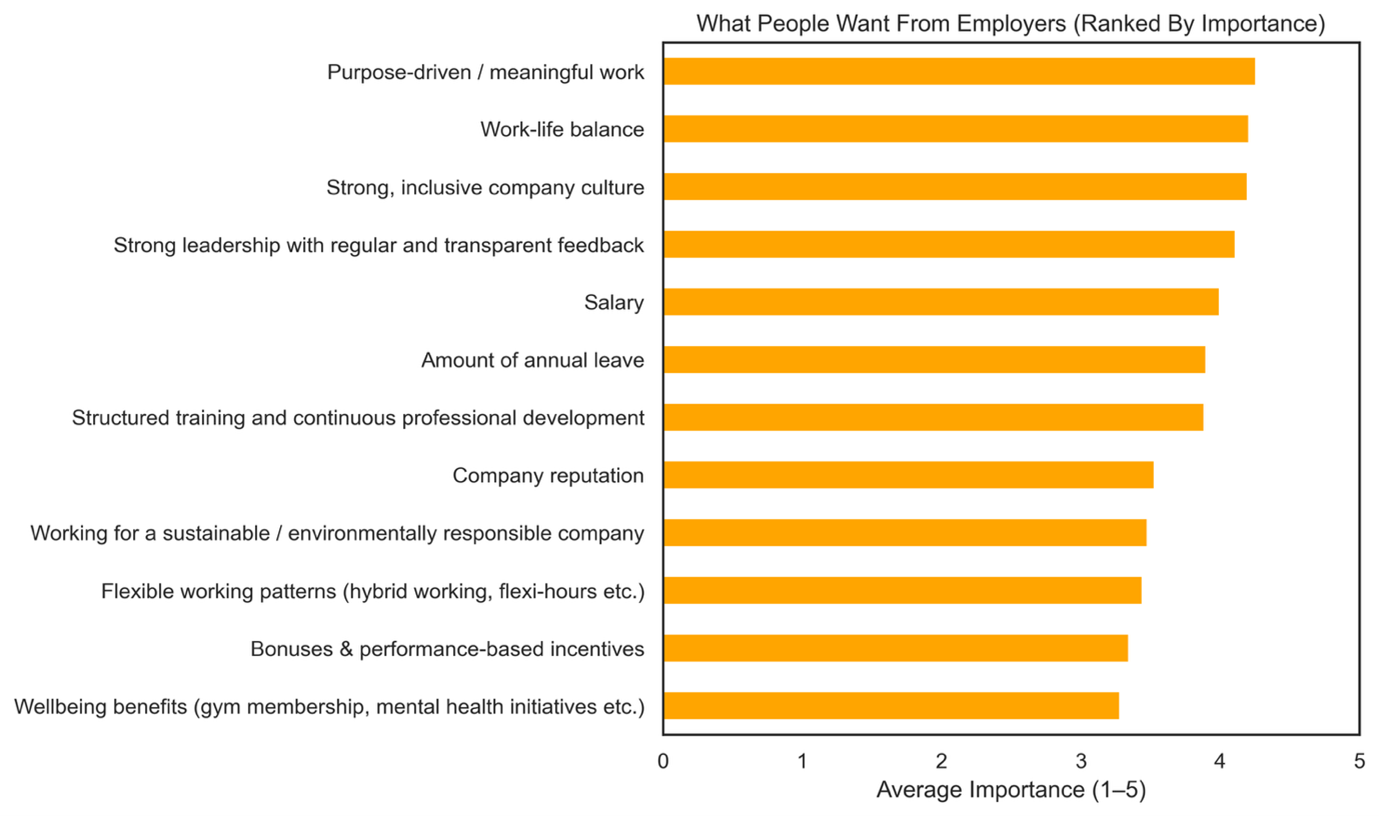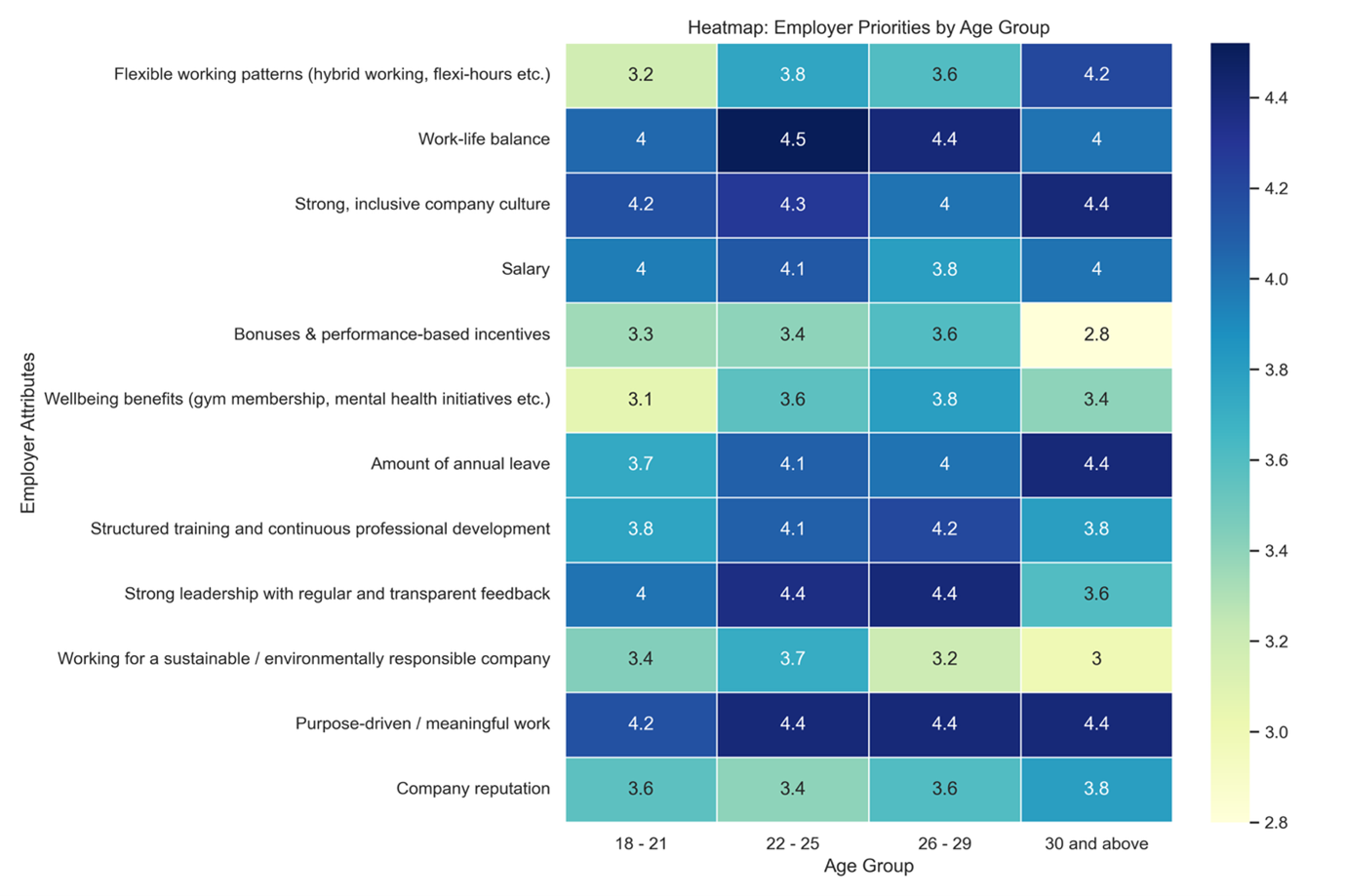What Candidates Really Want: Insights into Employer Preferences from the Next Generation of Talent
Surveying over 80 young future or already professionals, this report uncovers what truly drives talent, and how employers can adapt to attract and retain them.
Gen Z already comprises 27% of the workforce - a figure that will only increase. Alarmingly, 65% of Gen Z employees leave their jobs within the first 12 months (Contreas, 2024; Abode, 2023; FMC Talent, 2024). Their increasing presence highlights the urgency of understanding what they want and expect from employers, particularly when their short tenures disrupt teams and increase turnover-related costs.
A survey containing over 80 respondents assessed their priorities of what they wanted from their employers. Respondents were classified into age groups: 18-21, 22-25, 26-29 and 30+. Respondents ranked the importance they placed on 12 priorities on a scale of 1-5 (5 being extremely important and 1 being not at all important). This article will examine the valuable insights collated from the data.

The above figure depicts the average importance of the 12 employer attributes across the entire sample, sorted from most to least important.
The top three attributes were:
- purpose driven and meaningful work (average score of 4.26),
- work life balance (4.21),
- and a strong, inclusive company culture (4.20).
Conversely, the three lowest ranking priorities were:
- wellbeing benefits (3.28),
- bonuses and performance-based incentives (3.35),
- and flexible working patterns (3.44).
Evident from these results, employers are encouraged to establish a strong sense of purpose and inclusivity within the workplace whilst ensuring time and flexibility for balance. Additionally, financial resources and effort may be reallocated from priorities concerning wellbeing benefits, bonuses and flexibility in working patterns in order to support these efforts.
There were some surprising results in the data. Firstly, we take notice of the relatively low rankings for the financial priorities. Salary (ranked 5th with an average score of 4.0) ranks below several attributes concerning purpose, balance, culture and leadership. Moreso, bonuses being ranked second least important highlights the relative disregard for financial performance-based incentives. Another interesting insight was the relatively low ranking of Company reputation (ranked 8th with an average score of 3.5). This is possibly suggestive of a move away from placing importance on prestige towards experience and meaning. Consequently, even prestigious firms held in high regard have to consider the implications of their culture, work-life balance and purpose.
Despite these insightful patterns, we were interested in whether unique patterns arose from segregating the data by age groups; indeed, this is what we found.

Top Three Priorities by Age Group:
- 18-21: Strong, inclusive company culture; Purpose-driven / meaningful work; Work-life balance
- 22-25: Work life balance; Purpose-driven / meaningful work; Strong leadership with regular and transparent feedback
- 26-29: Work life balance; Strong leadership with regular and transparent feedback; Purpose-driven / meaningful work
- 30+: Strong, inclusive company culture; Amount of annual leave; Purpose-driven / meaningful work
The apparent first thing is that purpose-driven and meaningful work is of great importance across the age groups. Consequently, employers should ensure that they are getting their employers to execute tasks that matter. Work-life balance is relatively more important for those aged 18-29 compared to those aged 30+. However, the average importance score of work-life balance for those 30+ was still 4.0, on par with those aged 18-21. Hence, it is another factor that employers should make significant considerations towards.
Interestingly, the amount of annual leave was ranked as 6th overall in terms of importance; but when isolating those aged 30+ it becomes the second most valued attribute. The latter doesn’t come as too surprising given that other significant commitments, namely family, start to emerge. Thus, employers are encouraged to tailor their offerings to different age groups in line with their priorities.
The top three priorities of 22-25- and 26–29-year-olds were basically identical. However, 22–25-year-olds placed greater importance on purposeful work over strong leadership and feedback, whilst the 26-29-year-olds showed the opposite pattern.
Variation Across Age Groups
Flexible Working Patterns were most valued by those 30 and above (avg. 4.2) in comparison this priority was least valued by 18–21-year-olds (avg. 3.17). This variable had the biggest difference between age groups (1.03). This suggests that older professionals place a greater emphasis on flexibility, likely due to life responsibilities outside work, while younger workers may prioritise structure and learning opportunities.
Bonuses & Performance-Based Incentives scored highest among 26–29 year olds (avg. 3.6) and was scored lowest among the 30+ group (avg. 2.8). This difference of 0.8 was the second largest variation across age groups. Bonuses may resonate more with early to mid-career professionals striving to maximise earnings and performance recognition, whereas older workers may prefer stability or intrinsic motivations in their work. This should be noted by employers to ensure that they understand the differing drives of their employees.
Similarly, for strong Leadership & Transparent Feedback, 26–29-year-olds again lead (avg. 4.4), indicating a demand for clear direction and personal development. This contrasts with those aged 30+ (avg. 3.6) who may rely more on autonomy and experience in their work. Leadership quality appears especially important to early to mid-career professionals who are actively growing within their roles. These insights showcase that there are variations in the priorities of young talent when segregating by age groups. Contrastingly, Purpose-driven / meaningful work showed the least variation across the age groups.
Surprisingly, the oldest age group (30 and above) showed the lowest variation in their responses - with an average standard deviation of 0.90 across attributes - while the 22-25 group showed the most variation at 1.05. The youngest group (18–21) sat in the middle at 0.96.
This contradicts the assumption that older professionals show more selective or differentiated preferences. Instead, it may suggest that the oldest group has clearer, more consistent expectations, while those in their early to mid-20s are still exploring and experimenting, leading to wider variation in what they say they value. The 18–21 group tends to rate most things relatively high and uniformly - possibly due to limited workplace experience, causing them to express general enthusiasm without clear prioritisation.
In contrast, the 30+ cohort may have developed a more focused understanding of what truly matters, confidently rating some factors lower while prioritising others. This insight supports the idea that employers should not only segment by age but also recognise the evolving clarity of priorities across career stages.
Summary
This research highlights the critical importance of recognising that “young talent” is not a homogenous group. While purpose-driven work stands out as a shared priority across all age ranges, other values such as flexibility, leadership, and benefits show significant variation depending on career stage and life context.
For employers, this presents both a challenge and an opportunity: rather than deploying a blanket approach to hiring and retention, there is clear value in segmenting early-career professionals by age group andtailoring strategies accordingly. Younger employees may require structure, meaning, and inclusive culture, while those further into their twenties or early thirties increasingly seek autonomy, reward, and leadership development. In a talent landscape where Gen Z is growing rapidly and turnover is high, understanding and responding to these nuanced priorities is essential, not only to attract top candidates but to build workplaces where they choose to stay and thrive.
Hugo Walsh